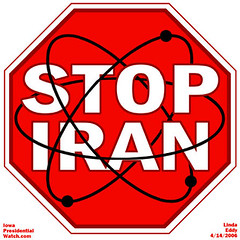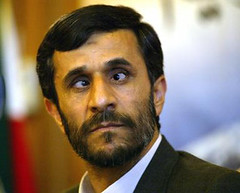Tuesday, February 20, 2007
TRUE OR FALSE? Maliki Letter
Back Channels believe this letter may be "forged" - but forged to out the truth of Maliki and his close ties to Moqtada Al-Sadr and document an overheard discussion which actually took place.
Interesting on its own are the names of the 11 leaders named as pro-Iran activists.
The Iraqi Prime Minister advised the Mahdi Army leaders to hide in Iran, revealed a leaked letter from the office of the prime minister and posted online by the Kurdish website peyamner on Tuesday.
A letter issued by the office of the Iraqi Prime Minister, Nuri al-Maliki, with the coordination of the Iraqi National Security Advisor, Muwaffaq al-Rabii, advises Muqtada al-Sadr to hide the leaders of his militants, the Mahdi Army, in the Islamic Republic of Iran, in case they are “arrested or killed by the American forces”.
Al-Maliki, in his letter states, “The current situation requires to keep the leaders of the Mahdi Army, who are affiliated to the organisation of the Iranian Revolutionary Guards, away from the front line.”
The letter, dated 14 January 2007 and signed by Iraqi Prime Minister, is written after a telephone conversation between Muqtada al-Sadr and the Iraqi Prime Minister.
The Iraqi National Security Advisor, Muwaffaq al-Rabii appears to be part of the operation. The letter is classified as confidential, private and immediate.
The letter states the name of 11 leaders of the Mahdi Army who have links with the Islamic Guards and who are advised by the office of the Prime Minister to leave to Iran.
They are:
Abas al-Kufi,
Amir Muhsin Khwja,
Salim Hussein,
Azhar al-Maliki,
al-Shiekh Farhan al-Sayidi (Najaf),
Fadhil al-Sarii (the adviser of the Prime Minister),
Riyadh al-Nuri (Najaf),
Ali al-Firtusi,
Hayidar al-Araji,
Ahmad al-Darraji,
Amir al-Sayidi.
The letter is copied to the Iranian Embassy in Baghdad, the leadership of the Supreme Council for Islamic Revolution in Iraq (SCIRI) and the office of al-Sadr.
Sources in the “Ahwaz Revolution Information Center” have alleged the presence of Sadrist elements and cadres in the Ahwaz region of southwest Iran, which has a large ethnic Arab population.
In a statement, the center says its sources have observed some of the leadership of the Mahdi Army and its elements in the two border cities of Muhamra and Abadan, with an escort of Iranian guards, and under the auspices of the administrative area (qa’im maqam) (Deputy chief) of Abadan.
The Sadrists arrived in “not insignificant” numbers, the statement says, and their appearance was noticed on Sunday (February 18th)in these two cities on the border near Basra.
This area of Iran, also known as Khuzistan, has a large Arab population. The Ahwaz Revolution Information Center represents an ethnic Arab movement within Iran, and is opposed to the Iranian regime.
The Ahwaz Center's statement alleges that the administrative area of Abadan prepared the facilities for the Sadrists travel in these two cities, and has supplied them with identification and Iranian permits, so that their presence can go unnoticed.
Subscribe to:
Post Comments (Atom)














No comments:
Post a Comment